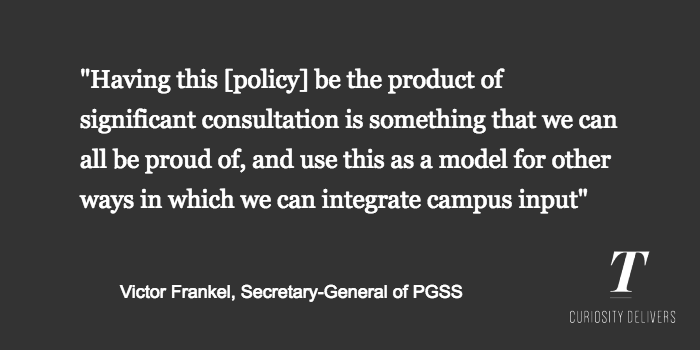Policy against Sexual Violence
On Nov. 23, the McGill Senate unanimously approved the Policy against Sexual Violence. With the Senate’s approval, the Policy will now proceed to the Board of Governors for approval on Dec. 1. Student staff and administration representatives will form a committee for the implementation of the Policy. It also calls for the creation of a physical office for students and staff to report incidents of sexual violence to the administration.
The Sexual Assault Policy Proposal group (SAPP), which was formed in 2013 following allegations of sexual assault against numerous McGill Redmen football players, had its own draft of the sexual assault policy rejected in April 2016. On Sept. 12, the university released its Draft Policy against Sexual Violence.
The Policy defines sexual violence as a sexual act or acts targeting a person’s sexuality, gender identity, or gender expression without the person’s consent. It is survivor-focused and will tackle sexual violence on campus through education, survivor support, and effectively responding to sexual violence disclosure and reports through the creation of the Office for Sexual Violence Response, Support and Education. Olliver Dyens, deputy provost (Student Life and Learning), spoke strongly in favour of the Policy to the Senate.
“This Policy does everything that needs to be done,” Dyens said. “The next step is [committing] to addressing this issue. [….] The Policy provides everything we need to [move] forward.”
Victor Frankel, secretary-general of the Post-Graduate Students’ Society (PGSS), highlighted the time and effort involved in the creation of this Policy.
“Having this [Policy] be the product of significant consultation is something that we can all be proud of, and use this as a model for other ways in which we can integrate campus input,” Frankel said.
The administration met with over 30 interest groups, collected online feedback from the McGill community, and worked with a consulting firm, Parker P Consulting, while developing the Policy. Its approval adds a number of items to the Senate’s agenda. An ad hoc panel will form within four months to study sexual violence at McGill and determine the university's jurisdiction in responding to reports of incidents. In the coming months, appointments to the Office for Sexual Violence will be made and consultations will be held with campus groups, including the Students’ Society of McGill University (SSMU) and the Sexual Assault Centre of the McGill Students’ Society (SACOMSS). The procedure for responding to reports of sexual violence will be revised as the implementation plan is further developed.
Christopher Manfredi, provost and vice-principal (Academic), emphasized that addressing sexual violence on campus will be an ongoing process.
“The Policy has built into it a very robust review process,” Manfredi said. “It will allow this to be an iterative process, a continuous improvement of the Policy as we go forward and see how it works on the ground.”
According to the final draft presented to Senate, the Office for Sexual Violence will bring together qualified staff to effectively respond to all reports of sexual violence. It will also create a confidential monitoring framework in order to develop a statistical analysis of incidences of assault at the university.
Report on sustainability
Senate also discussed a report on Nov. 10’s Joint Board-Senate meeting, which focused primarily on sustainability initiatives. Principal Suzanne Fortier spoke about McGill’s sustainability rating by the Association for the Advancement of Sustainability in Higher Education (AASHE).
“Where we get our lowest and a terrible, terrible mark, is on water [intake],” Fortier said. “[We’re] taking it for granted that we have good water readily accessible to us and we’re wasting it.”
The report collected senators’ ideas for immediate, medium, and long-term actions to make McGill a more sustainable campus, including conducting energy usage audits, making McGill’s campus disposable water-bottle free, and creating a Sustainability Task Force.
“We’ve put aside $10 million for the next five years for our initiatives in sustainability sciences,” Manfredi said.
This piece was last updated on Nov. 28.









